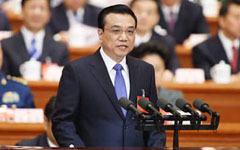Slowing but better economy ahead: Caterpillar
Updated: 2014-03-24 15:23
(Xinhua)
|
|||||||||||
BEIJING - The slowdown in economic growth will lead a healthy development in a longer term in China as the country is pushing forward all-round reforms, a senior executive of Caterpillar, a United States-based construction equipment maker, said on Saturday.
"Every developing country that has grown quickly usually faces an adjustment period," said Douglas Oberhelman, Caterpillar Inc Chairman and Chief Executive Officer, during an interview by Xinhua.
He applauded that the new leadership of China lowered the economic growth target to 7-8 percent, which is rational after a tremendous boom in the last decade.
 |
 |
 |
"The target should allow the urbanization to occur, and so much reform the government did will put China onto a more sustainable path," Oberhelman said.
He encouraged the endeavors in market orientation, environmental sustainability and development of capital markets including exchange rate, debt and equity issuance.
"There are always winners and losers," Oberhelman said, "the companies with low technology and less competence should be allowed to fail, which is extremely healthy for an economy to follow a market-oriented development."
The CEO specially stressed the work to improve air and water quality, which weigh even more in a country like China with such a huge population.
He agreed to faster industrial reforms to preserve the environment, and wished the called "tier-four technology" with clean emissions can benefit Chinese cities as soon as possible just like in west Europe, the United States and Japan.
Meanwhile, the CEO mentioned the importance of intellectual property in the machinery industry, which he regarded as a core competitiveness for its company when facing Chinese local machinery manufacturers.
"High quality and high productive equipment along with independent dealer organization for the daily customer services helped Caterpillar take a large market share," Oberhelman said.
Preserving intellectual property is another necessary reform for China to focus on, and the country cannot be a leading power in the world without internal intellectual property protection, he added.
Caterpillar's global sales and revenue in 2013 were $55.66 billion, down 16 percent year on year. The decline was primarily driven by a drastic drop in sales of new machines for mining, according to its official report.
However, the company's the total sales and revenues in China stood at about $3.5 billion last year, up over 20 percent from 2012.
Caterpillar so far has established 28 manufacturing facilities and 4 dealers covering 27 Chinese provinces and municipalities with about 10,000 employees in China.
Related Stories
Confidence in construction machinery market builds 2013-04-11 10:28
China's urbanization presents opportunities: Caterpillar 2013-03-27 11:26
China challenged to upgrade industries: Caterpillar 2013-03-11 17:35
China should manage reform tradeoff, implementation 2014-03-24 13:20
China on new growth track within 2 years 2014-03-24 13:06
Today's Top News
China, the Netherlands seek closer co-op
Crimea is part of Russia
Images may help solve jet mystery
Obamas wowed by China
Xi leaves Beijing for first trip to Europe
Beijing beefs up hunt for missing jet
Putin signs law on Crimea accession
Australia to resume ocean search for missing jet
Hot Topics
Lunar probe , China growth forecasts, Emission rules get tougher, China seen through 'colored lens', International board,
Editor's Picks

|

|

|

|

|

|





